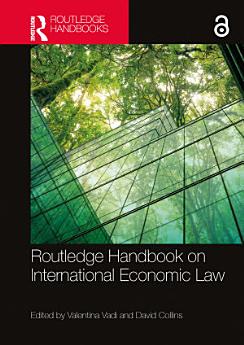Routledge Handbook on International Economic Law
About this ebook
The Handbook comprises five main parts. Part I deals with the history and theory of the discipline. Parts II, III, and IV deal with the main substantive areas of international economic law: international trade law, international investment law, and international financial and monetary law. Part V explores the link between international economic law and other international legal regimes, such as environmental law and human rights law, highlighting areas where tensions may occur between economic liberalization, sovereignty, and other concerns.
The Handbook investigates international economic law’s theory, policy, and practice from various perspectives. Its 31 chapters highlights central themes that have driven the development of this dynamic subject, reflecting the field as it exists now, while also serving as a point of departure for future studies. The book will provide a solid resource for scholars, students, policymakers, and practitioners in international law, international relations, political science, and economics.
About the author
Valentina Vadi is Adjunct Professor in International Law at the School of Political Sciences of the University of Florence, Italy and Jean Monnet Fellow at the Robert Schuman Centre for Advanced Studies, European University Institute, Florence, Italy.
David Collins is Professor of International Economic Law at the City Law School of City St George’s, University of London.
